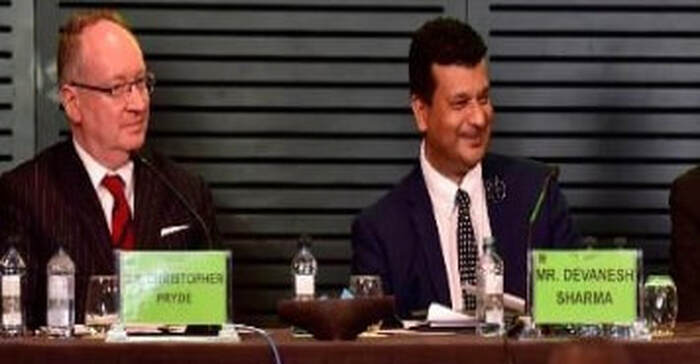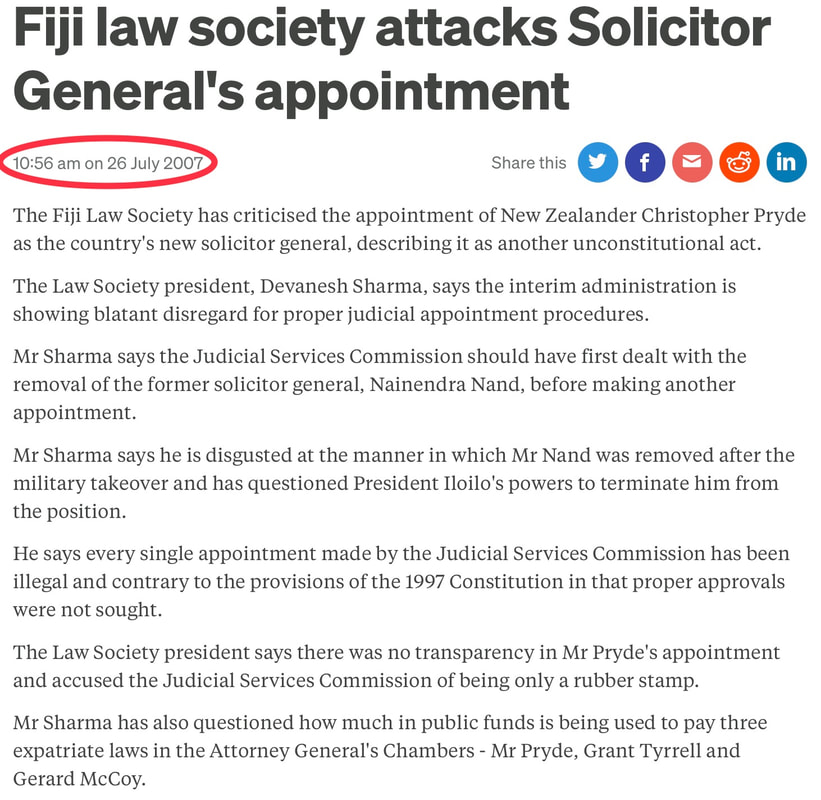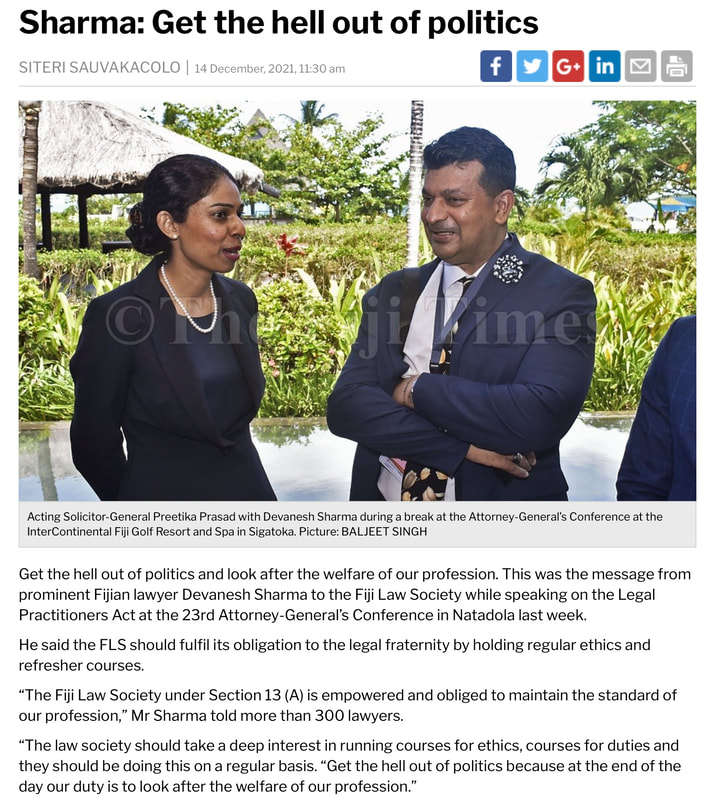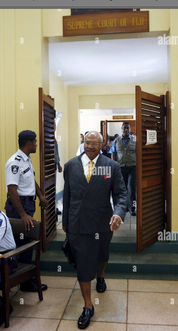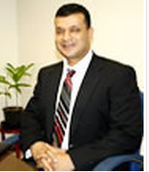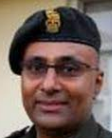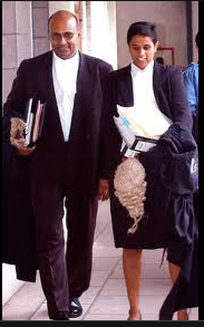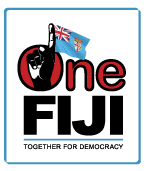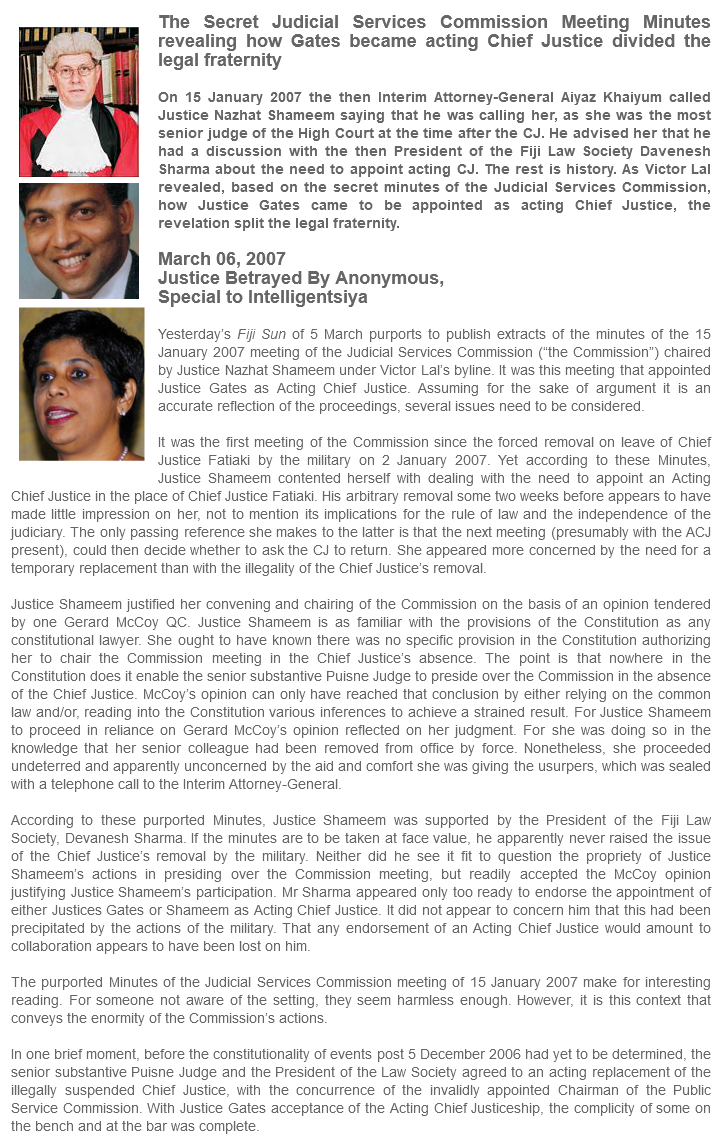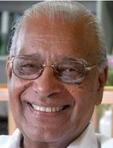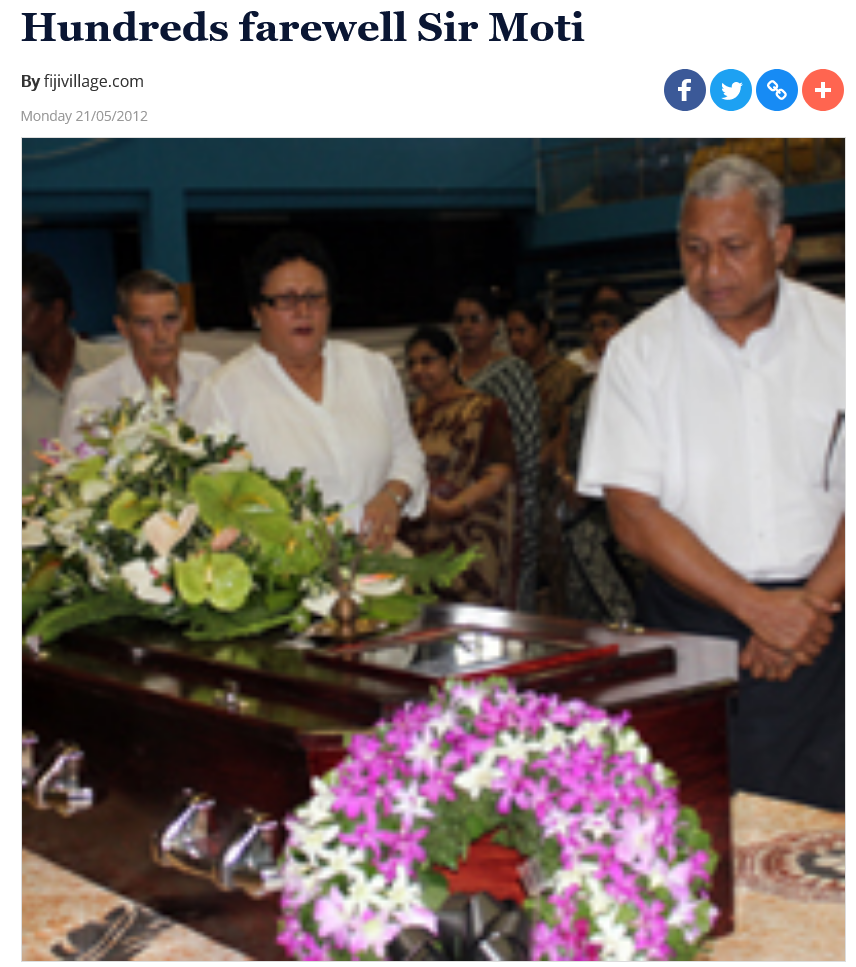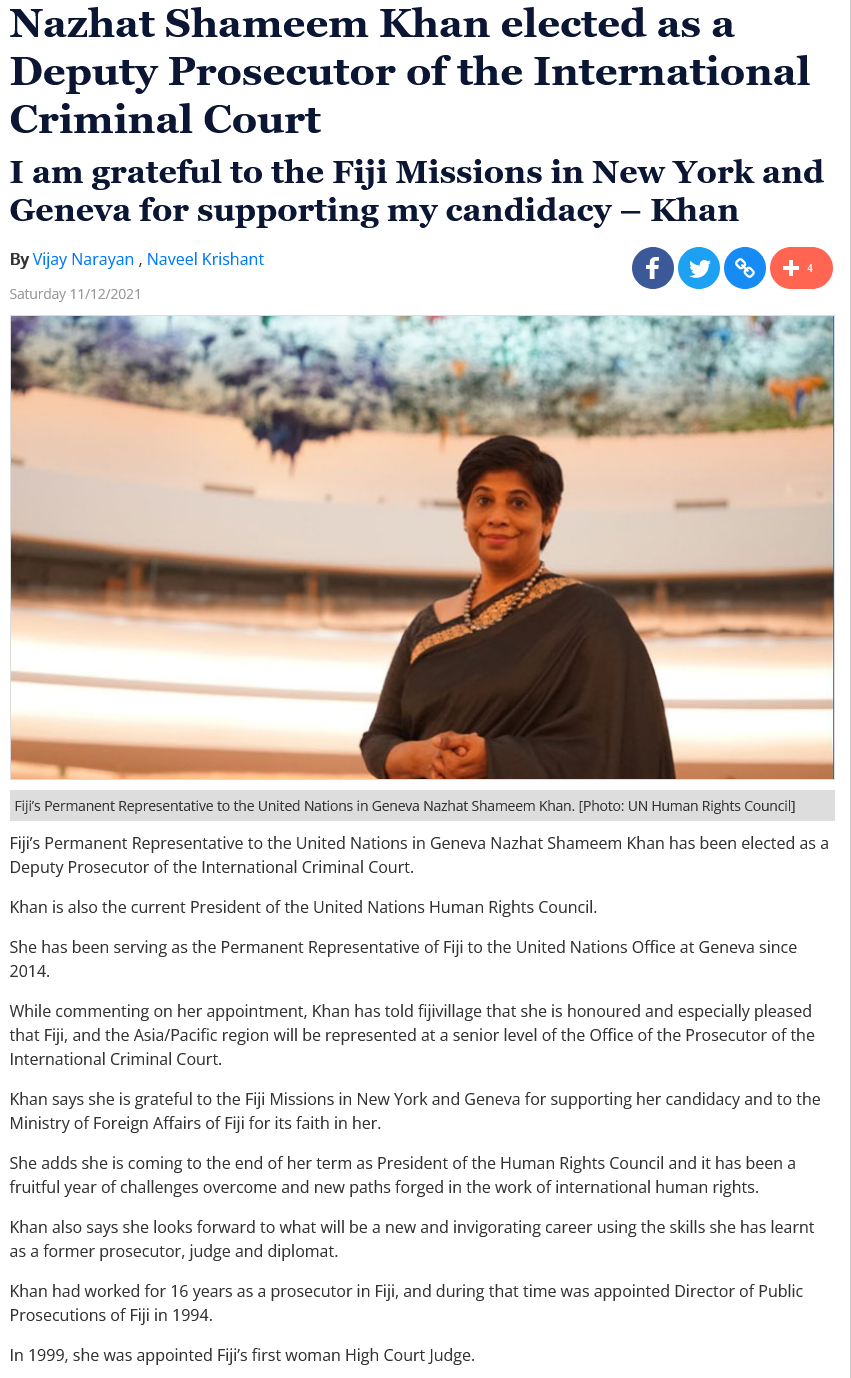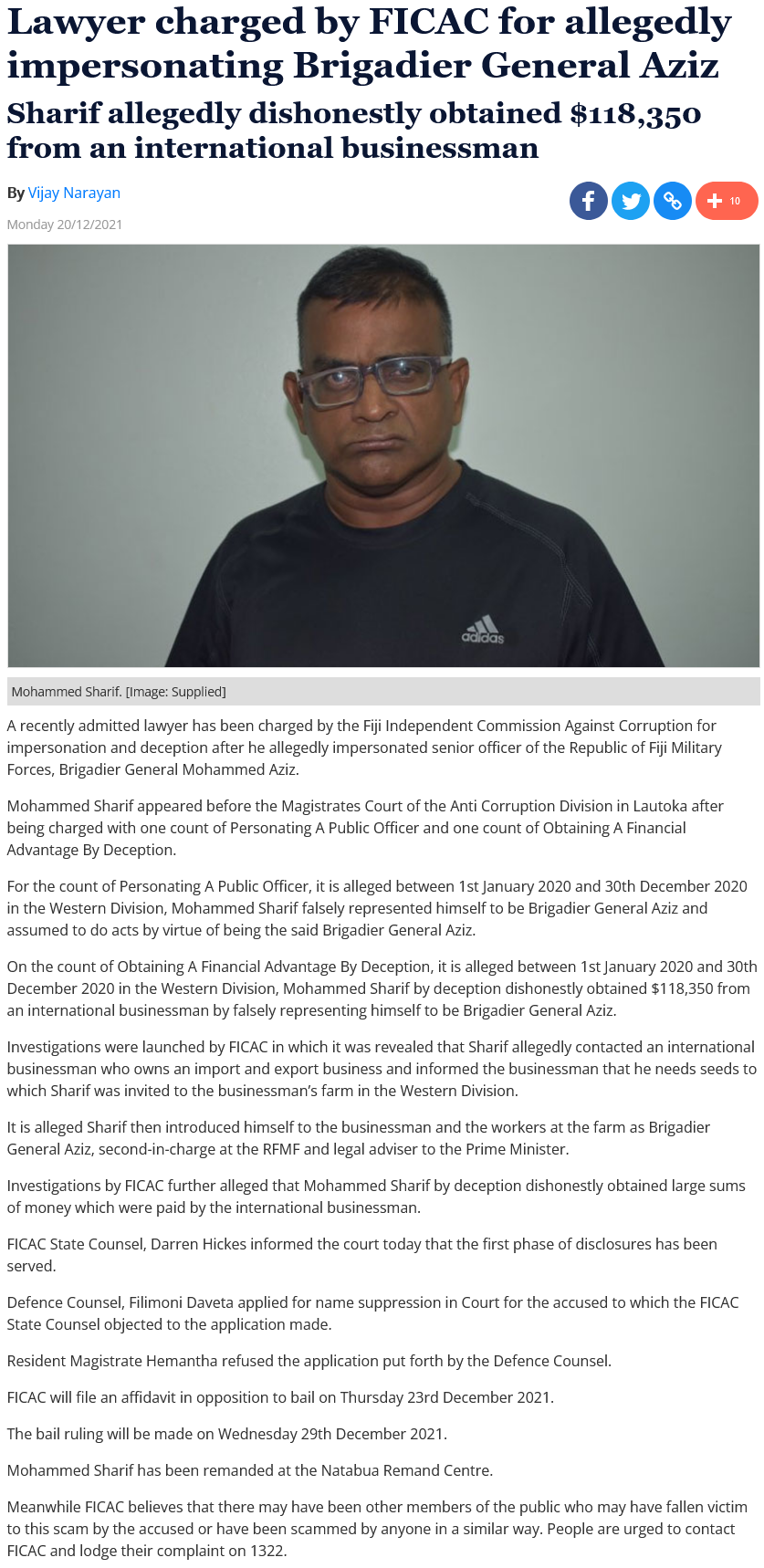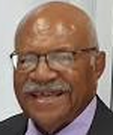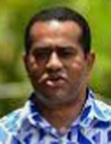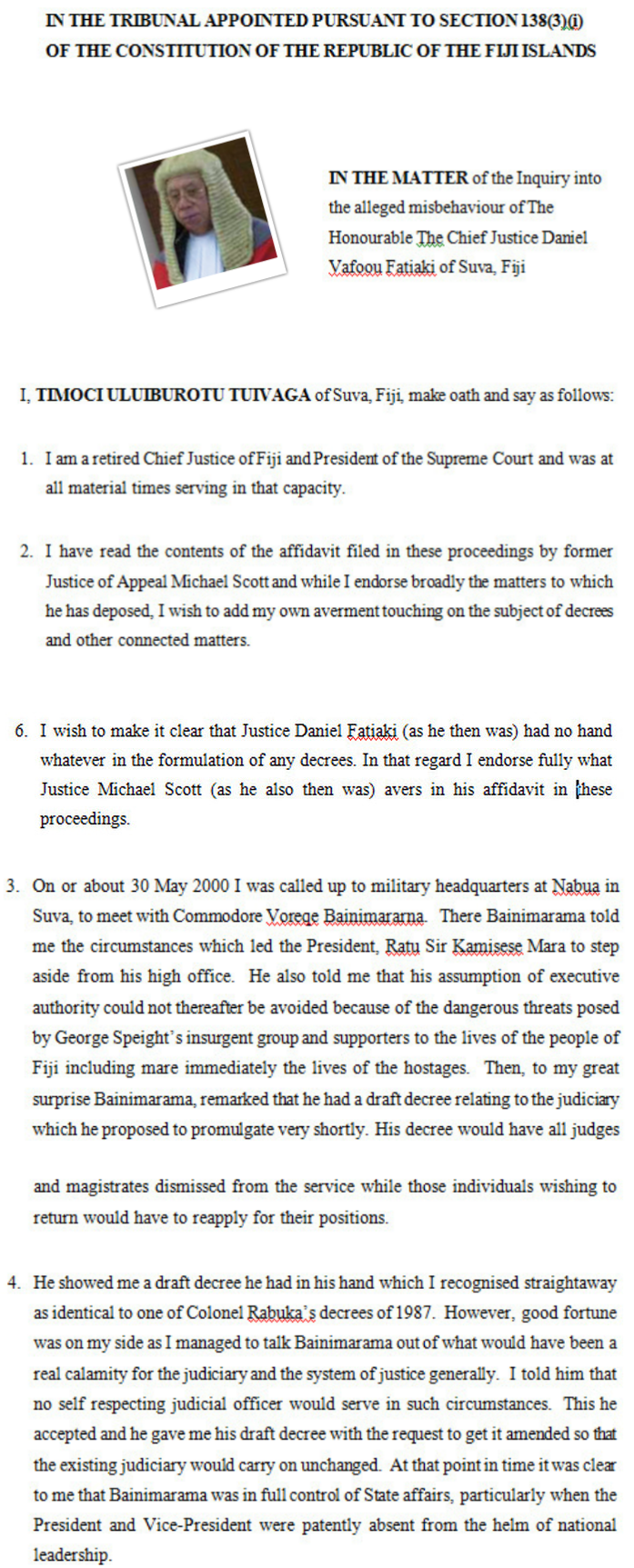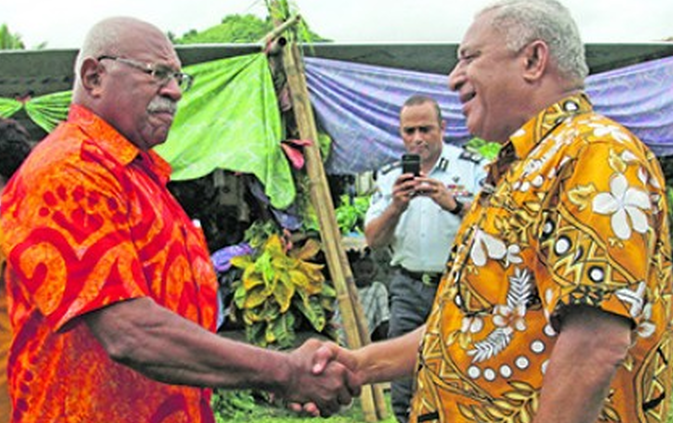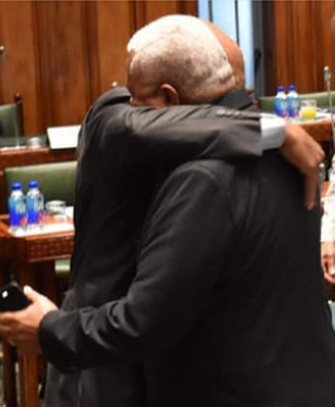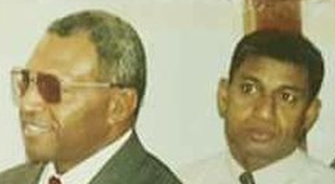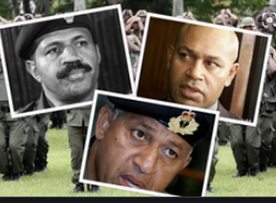"The Interim Administration is showing blatant disregard for proper judicial appointment procedures. The Judicial Services Commission should have first dealt with the removal of the former Solicitor-General NAINENDRA NAND, before making another appointment [of Christopher Pryde]. I am disgusted at the manner in which Mr Nand was removed after the military takeover. What power did President Iloilo have to terminate Nand from the position" FLS President Sharma, 2007
"The president of the Fiji Law Society, Devanesh Sharma, has suspended military lawyers and is demanding to know what help, if any, they gave to Commodore Frank Bainimarama when he took over the Laisenia Qarase government on December 5. He says these lawyers risk losing their practising certificates if they do not give a satisfactory explanation. He says the lawyers failed to uphold the law because in the opinion of the society, the coup is illegal...Mr Sharma's actions against the military lawyers, however, raise some very fundamental and disturbing questions: what role should a lawyer play in society or to what extent must he or she provide legal advice to an institution to which he or she belongs; and why should there be two laws, one for fat pay lawyers in private practice and one for military lawyers? Unlike the private lawyers, both civilian and military laws govern the military lawyers like their foot soldier colleagues. However, as part of their employment, they were required by military law to tender legal advice to their military boss, the Commodore on the Doctrine of Necessity. It was up to the Commodore, who to some extent was the author of the creation of the necessity, to accept or reject their advice. Mr Sharma also alleges that some members of the legal profession outside the military are heavily involved in giving legal advice, doing research and writing speeches supporting the military. Who are they? Can he provide names? If the Commodore's actions (based on legal advice from his or outside lawyers) are illegal, than surely it could be challenged in a court of law by none other than Mr Sharma who has a history of defending those accused of coup and mutiny related cases. Mr Sharma was part of the legal team that defended Mr Rabuka who [on December 10] was acquitted after a split verdict (guilty and not guilty) on two counts of inciting mutiny against the Commodore at the Queen Elizabeth Barracks in July and November of 2000. What difference does it make if one military lawyer, in the course of his duty, has tendered legal advice that might have resulted in the recent coup, and another private lawyer has no hesitation or conscience to defend the Father of Coups in the country - Mr Rabuka - who accepts that he committed treason in 1987 when he executed two coups against the democratically elected Bavadra government because "There Was No Other Way." The law is meant to be blind. Why should there be two laws: one for private lawyers and one for military or government lawyers when it comes to questions of legality and illegality in Fiji? It is time, to use a lawyer's phrase, Mr Sharma recused himself from lecturing to the military lawyers or to other lawyers who have tendered legal advice to the Commodore or will continue to do so in the future. The "clean up" begins with him.
VICTOR LAL, The Fiji Sun, 15 December 2006

COMMENTARY, reproduced from The Fiji Sun, 15 December 2006
By Victor Lal
The president of the Fiji Law Society, Devanesh Sharma, has suspended military lawyers and is demanding to know what help, if any, they gave to Commodore Frank Bainimarama when he took over the Laisenia Qarase government on December 5.
He says these lawyers risk losing their practising certificates if they do not give a satisfactory explanation. He says the lawyers failed to uphold the law because in the opinion of the society, the coup is illegal.
Interestingly, the overthrown Prime Minister Qarase, shortly before he was deposed, questioned why the society was silent on the recent developments and was not speaking out with one voice, including their overseas counterparts. Sadly, when the former president of the society, Graham Leung, called on Mr Qarase in May 2005 to abandon the Reconciliation and Unity Bill because it posed a serious threat to the rule of law, undermined the independence of the judiciary, and was perhaps unconstitutional, Mr Qarase refused to listen.
Also, when the society called upon Mr Qarase to abide by the Court of Appeal decision and hand over power to Mahendra Chaudhry in 2001, Mr Qarase simply ignored the court ruling or the call from the legal fraternity.
Mr Sharma's actions against the military lawyers, however, raise some very fundamental and disturbing questions: what role should a lawyer play in society or to what extent must he or she provide legal advice to an institution to which he or she belongs; and why should there be two laws, one for fat pay lawyers in private practice and one for military lawyers?
Unlike the private lawyers, both civilian and military laws govern the military lawyers like their foot soldier colleagues. However, as part of their employment, they were required by military law to tender legal advice to their military boss, the Commodore on the Doctrine of Necessity. It was up to the Commodore, who to some extent was the author of the creation of the necessity, to accept or reject their advice.
Mr Sharma also alleges that some members of the legal profession outside the military are heavily involved in giving legal advice, doing research and writing speeches supporting the military. Who are they? Can he provide names? If the Commodore's actions (based on legal advice from his or outside lawyers) are illegal, than surely it could be challenged in a court of law by none other than Mr Sharma who has a history of defending those accused of coup and mutiny related cases.
Mr Sharma was part of the legal team that defended Mr Rabuka who [on December 10] was acquitted after a split verdict (guilty and not guilty) on two counts of inciting mutiny against the Commodore at the Queen Elizabeth Barracks in July and November of 2000. What difference does it make if one military lawyer, in the course of his duty, has tendered legal advice that might have resulted in the recent coup, and another private lawyer has no hesitation or conscience to defend the Father of Coups in the country - Mr Rabuka - who accepts that he committed treason in 1987 when he executed two coups against the democratically elected Bavadra government because "There Was No Other Way."
Moreover, it was none other than Mr Rabuka who emasculated the judiciary by jailing outspoken judges (like Justice Kishore Govind) and expelling from the Bench overseas judges from Fiji. Mr Rabuka ruled the country through the notorious Decree 12, which allowed for arbitrary detention in such a way as to deny recourse to habeas corpus rights and other forms of appeal.
The judiciary was entirely re-shuffled consonant with the new concept of Taukei justice. And the 1970 Constitution was torn to shreds.
What about the events of 2000? The ousted Attorney-General, Qoriniasi Bale, who was allegedly involved with Mr Rabuka in the 1987 coups, was the principal defendant in the Chandrika Prasad case on the 1997 Constitution. He was part of the Interim Civilian Government following George Speight's failed 2000 coup, and under his legal jurisdiction the ICG issued 30 decrees between July 17 and the end of 2000 and a further four decrees in 2001 to January 12.
He, along with the ousted Prime Minister, refused to hand over power to the Peoples Coalition Government of Mahendra Chaudhry despite the Fiji Court of Appeal ruling, and following the two successive general elections remained as AG until Commodore Bainimarama ousted him recently.
I would be very interested to know if the society directed all its members, including Mr Sharma, not to have any dealings or contacts with the ousted and un-elected Attorney-General who had colluded with Commodore Bainimarama and others in the drafting of decrees following the illegal seizure of power by George Speight and his shadowy characters. These characters were exposed as the former Vice-President Ratu Jope Seniloli, Deputy Speaker Ratu Rakuita Vakalalabure and others. They were also charged with taking treasonous oaths of office to serve in a rebel government under George Speight at a time when the legitimate Head of State, the late Ratu Sir Kamisese Mara, was struggling to prevent the nation from descending into chaos.
Both were jailed for lengthy terms by Justice Shameem, only to be released on dubious grounds by Mr Bale to serve their prison terms extramurally. In Ratu Jope's case, he was out in three months on controversial medical grounds. The release of these convicts had angered the Commodore, and may have been a part of his list of reasons to launch the so-called 'clean up campaign'.
The Miliatry took an extraordinary step by issuing a public statement against Ratu Jope's release. Captain Neumi Leweni called the early release "an insult to our sense of justice and the rule of law" and a "riot" He and other senior military personnel said they believed the release of Ratu Jope was a political ploy to gain the support of "the same type of people who gathered in droves at the parliamentary complex in 2000" - a reference to the supporters of the coup.
The officers predicted that if Mr Bale was not reined in quickly, there could be "a return to the mayhem of 2000" The military argued that that Ratu Jope's release threatened national security.
The decision to release Ratu Jope on CSO was based on merit and the medical report, Mr Bale claimed. He said Ratu Jope's medical condition was confidential between him and the doctors and should not be disclosed without their consent. This, he said, was the law. The former Leader of Opposition, Mick Beddoes, wanted the names of the doctors who advised the release of Ratu Jope disclosed. He also called on Mr Bale to disclose the illness. He said people had a right to know the truth because "they may conclude that Ratu Jope's resignation and subsequent decision not to contest his guilt was a trade off for his release".
Mr Bale maintained he could not divulge details citing patient-doctor confidentiality.
If that is the case concerning Ratu Jope, one may ask Mr Sharma why should the military lawyers be forced by the society to disclose what advice, if any, they tendered to their military boss in the course of their duty as legal advisers to the military. Maybe, the Commodore should see if he can "clear the truth" about the medical record.
In any event, it was only recently that Justice Jiten Singh delivered judgment in a legal action brought by the Citizens' Constitutional Forum to challenge the release of Ratu Jope from prison in November 2004 under the CSO by Mr Bale. Justice Singh's decision upheld the CCF's challenge on the ground of bias or perceived bias, because, in the judge's words, "an informed observer would have serious misgivings about the impartiality of the first respondent (the Minister) in granting the CSO to the second respondent (Ratu Jope)"
The CCF sought an order of certiorari to quash Mr Bale's decision. Justice Singh did find that the CSO was flawed but did not order the CSO for Ratu Jope be quashed.
Both Ratu Jope and the ousted State are appealing against Judge Jiten Singh's ruling. Mr Sharma represents Ratu Jope. Will Ratu Jope return the pay he (Ratu Jope) received during the trial, and continues to receive a pension equivalent to 30 per cent of his Vice-Presidential salary, despite being caught on video camera swearing-in- Speight's Cabinet Ministers? Will those in the Great Council of Chiefs, who appointed Ratu Jope as Vice-President, and those MPs who elected Mr Vakalalabure as Deputy Speaker after the 2000 crisis also be hauled before the courts for aiding treasonists?
Meanwhile, the Great Council of Chiefs has joined Mr Sharma in condemning the military lawyers.
For God's sake, stop the hypocrisy. Where was the GCC, which strictly speaking, is not exclusively made up of chiefs but also of commoners, when its own legal adviser, Mr Bale, was discarding the rule of law with impunity, and was also suspended for five years from the Fiji Law Society for misusing trust funds?
Finally, Mr Sharma also represents Lieutenant-Colonel Jone Baledrokadroka, the Commodore's former second-in-command, who is facing a mutiny inquiry for allegedly confronting the Commodore about his (Commodore's) anti-government statements before the takeover of the Qarase government. Is there not a conflict of interest in his demands - of actual or perceived bias in his treatment of the military lawyers?
It is equally legitimate to ask Mr Sharma what right does he have to defend those implicated in the 1987 and 2000 coups, and to ensure that they are acquitted as charged, and in the next breath to demand from the military lawyers what advice, if any, did they tender to the Commodore in the takeover of government, which comprised Mr Bale, who himself had been no respecter of law as Minister of Justice?
The suspension is also a breach of the military lawyers rights under the Bill of Rights in the Constitution.
The law is meant to be blind. Why should there be two laws: one for private lawyers and one for military or government lawyers when it comes to questions of legality and illegality in Fiji?
It is time, to use a lawyer's phrase, Mr Sharma recused himself from lecturing to the military lawyers or to other lawyers who have tendered legal advice to the Commodore or will continue to do so in the future.
The "clean up" begins with him.
By Victor Lal
The president of the Fiji Law Society, Devanesh Sharma, has suspended military lawyers and is demanding to know what help, if any, they gave to Commodore Frank Bainimarama when he took over the Laisenia Qarase government on December 5.
He says these lawyers risk losing their practising certificates if they do not give a satisfactory explanation. He says the lawyers failed to uphold the law because in the opinion of the society, the coup is illegal.
Interestingly, the overthrown Prime Minister Qarase, shortly before he was deposed, questioned why the society was silent on the recent developments and was not speaking out with one voice, including their overseas counterparts. Sadly, when the former president of the society, Graham Leung, called on Mr Qarase in May 2005 to abandon the Reconciliation and Unity Bill because it posed a serious threat to the rule of law, undermined the independence of the judiciary, and was perhaps unconstitutional, Mr Qarase refused to listen.
Also, when the society called upon Mr Qarase to abide by the Court of Appeal decision and hand over power to Mahendra Chaudhry in 2001, Mr Qarase simply ignored the court ruling or the call from the legal fraternity.
Mr Sharma's actions against the military lawyers, however, raise some very fundamental and disturbing questions: what role should a lawyer play in society or to what extent must he or she provide legal advice to an institution to which he or she belongs; and why should there be two laws, one for fat pay lawyers in private practice and one for military lawyers?
Unlike the private lawyers, both civilian and military laws govern the military lawyers like their foot soldier colleagues. However, as part of their employment, they were required by military law to tender legal advice to their military boss, the Commodore on the Doctrine of Necessity. It was up to the Commodore, who to some extent was the author of the creation of the necessity, to accept or reject their advice.
Mr Sharma also alleges that some members of the legal profession outside the military are heavily involved in giving legal advice, doing research and writing speeches supporting the military. Who are they? Can he provide names? If the Commodore's actions (based on legal advice from his or outside lawyers) are illegal, than surely it could be challenged in a court of law by none other than Mr Sharma who has a history of defending those accused of coup and mutiny related cases.
Mr Sharma was part of the legal team that defended Mr Rabuka who [on December 10] was acquitted after a split verdict (guilty and not guilty) on two counts of inciting mutiny against the Commodore at the Queen Elizabeth Barracks in July and November of 2000. What difference does it make if one military lawyer, in the course of his duty, has tendered legal advice that might have resulted in the recent coup, and another private lawyer has no hesitation or conscience to defend the Father of Coups in the country - Mr Rabuka - who accepts that he committed treason in 1987 when he executed two coups against the democratically elected Bavadra government because "There Was No Other Way."
Moreover, it was none other than Mr Rabuka who emasculated the judiciary by jailing outspoken judges (like Justice Kishore Govind) and expelling from the Bench overseas judges from Fiji. Mr Rabuka ruled the country through the notorious Decree 12, which allowed for arbitrary detention in such a way as to deny recourse to habeas corpus rights and other forms of appeal.
The judiciary was entirely re-shuffled consonant with the new concept of Taukei justice. And the 1970 Constitution was torn to shreds.
What about the events of 2000? The ousted Attorney-General, Qoriniasi Bale, who was allegedly involved with Mr Rabuka in the 1987 coups, was the principal defendant in the Chandrika Prasad case on the 1997 Constitution. He was part of the Interim Civilian Government following George Speight's failed 2000 coup, and under his legal jurisdiction the ICG issued 30 decrees between July 17 and the end of 2000 and a further four decrees in 2001 to January 12.
He, along with the ousted Prime Minister, refused to hand over power to the Peoples Coalition Government of Mahendra Chaudhry despite the Fiji Court of Appeal ruling, and following the two successive general elections remained as AG until Commodore Bainimarama ousted him recently.
I would be very interested to know if the society directed all its members, including Mr Sharma, not to have any dealings or contacts with the ousted and un-elected Attorney-General who had colluded with Commodore Bainimarama and others in the drafting of decrees following the illegal seizure of power by George Speight and his shadowy characters. These characters were exposed as the former Vice-President Ratu Jope Seniloli, Deputy Speaker Ratu Rakuita Vakalalabure and others. They were also charged with taking treasonous oaths of office to serve in a rebel government under George Speight at a time when the legitimate Head of State, the late Ratu Sir Kamisese Mara, was struggling to prevent the nation from descending into chaos.
Both were jailed for lengthy terms by Justice Shameem, only to be released on dubious grounds by Mr Bale to serve their prison terms extramurally. In Ratu Jope's case, he was out in three months on controversial medical grounds. The release of these convicts had angered the Commodore, and may have been a part of his list of reasons to launch the so-called 'clean up campaign'.
The Miliatry took an extraordinary step by issuing a public statement against Ratu Jope's release. Captain Neumi Leweni called the early release "an insult to our sense of justice and the rule of law" and a "riot" He and other senior military personnel said they believed the release of Ratu Jope was a political ploy to gain the support of "the same type of people who gathered in droves at the parliamentary complex in 2000" - a reference to the supporters of the coup.
The officers predicted that if Mr Bale was not reined in quickly, there could be "a return to the mayhem of 2000" The military argued that that Ratu Jope's release threatened national security.
The decision to release Ratu Jope on CSO was based on merit and the medical report, Mr Bale claimed. He said Ratu Jope's medical condition was confidential between him and the doctors and should not be disclosed without their consent. This, he said, was the law. The former Leader of Opposition, Mick Beddoes, wanted the names of the doctors who advised the release of Ratu Jope disclosed. He also called on Mr Bale to disclose the illness. He said people had a right to know the truth because "they may conclude that Ratu Jope's resignation and subsequent decision not to contest his guilt was a trade off for his release".
Mr Bale maintained he could not divulge details citing patient-doctor confidentiality.
If that is the case concerning Ratu Jope, one may ask Mr Sharma why should the military lawyers be forced by the society to disclose what advice, if any, they tendered to their military boss in the course of their duty as legal advisers to the military. Maybe, the Commodore should see if he can "clear the truth" about the medical record.
In any event, it was only recently that Justice Jiten Singh delivered judgment in a legal action brought by the Citizens' Constitutional Forum to challenge the release of Ratu Jope from prison in November 2004 under the CSO by Mr Bale. Justice Singh's decision upheld the CCF's challenge on the ground of bias or perceived bias, because, in the judge's words, "an informed observer would have serious misgivings about the impartiality of the first respondent (the Minister) in granting the CSO to the second respondent (Ratu Jope)"
The CCF sought an order of certiorari to quash Mr Bale's decision. Justice Singh did find that the CSO was flawed but did not order the CSO for Ratu Jope be quashed.
Both Ratu Jope and the ousted State are appealing against Judge Jiten Singh's ruling. Mr Sharma represents Ratu Jope. Will Ratu Jope return the pay he (Ratu Jope) received during the trial, and continues to receive a pension equivalent to 30 per cent of his Vice-Presidential salary, despite being caught on video camera swearing-in- Speight's Cabinet Ministers? Will those in the Great Council of Chiefs, who appointed Ratu Jope as Vice-President, and those MPs who elected Mr Vakalalabure as Deputy Speaker after the 2000 crisis also be hauled before the courts for aiding treasonists?
Meanwhile, the Great Council of Chiefs has joined Mr Sharma in condemning the military lawyers.
For God's sake, stop the hypocrisy. Where was the GCC, which strictly speaking, is not exclusively made up of chiefs but also of commoners, when its own legal adviser, Mr Bale, was discarding the rule of law with impunity, and was also suspended for five years from the Fiji Law Society for misusing trust funds?
Finally, Mr Sharma also represents Lieutenant-Colonel Jone Baledrokadroka, the Commodore's former second-in-command, who is facing a mutiny inquiry for allegedly confronting the Commodore about his (Commodore's) anti-government statements before the takeover of the Qarase government. Is there not a conflict of interest in his demands - of actual or perceived bias in his treatment of the military lawyers?
It is equally legitimate to ask Mr Sharma what right does he have to defend those implicated in the 1987 and 2000 coups, and to ensure that they are acquitted as charged, and in the next breath to demand from the military lawyers what advice, if any, did they tender to the Commodore in the takeover of government, which comprised Mr Bale, who himself had been no respecter of law as Minister of Justice?
The suspension is also a breach of the military lawyers rights under the Bill of Rights in the Constitution.
The law is meant to be blind. Why should there be two laws: one for private lawyers and one for military or government lawyers when it comes to questions of legality and illegality in Fiji?
It is time, to use a lawyer's phrase, Mr Sharma recused himself from lecturing to the military lawyers or to other lawyers who have tendered legal advice to the Commodore or will continue to do so in the future.
The "clean up" begins with him.
RACISM had denied Justice Sir Moti Tikaram the Chief Justice position.
Thankfully, the University of Fiji hosts the annual Sir Moti Tikaram Memorial Lecture in honour of one who never became CJ of Fiji.
And it is SHOCKING to learn from secret e-mails leaked to Fijileaks that NFP leader BIMAN PRASAD, who claims to be representing Indo-Fijian interests, cutting a coalition deal with Rabuka's PAP to fight the 2022 election. Well, if so, lets give him the same political hiding as the voters gave in 1999, when another NFP leader, Jai Ram Reddy, was consigned to the political dust bin. Rabuka is the Root of all ROT in Fiji
________________________________________________________
The Fiji Law Society says lawyers have a duty to speak up and hold the government to account when it comes to issues relating to the rule of law.
President Wylie Clarke has written to the members after senior lawyer Devanesh Sharma called on the Society to get out of politics during the Attorney General’s Conference over the weekend. Clarke says while Sharma may disagree with some of their public statements, it is important to note the difference between politics and rule of law.
He has cited three instances where the Fiji Law Society has issued statements saying all dealt with rule of law matters.
Clarke also says in democratic countries, any government that holds the reins of power must expect criticism, and this does not mean that critics are involved in politics.
The Fiji Law Society President has written to all members saying the community looks to lawyers and the Society as a whole for objective and reasoned views on legal issues.
Clarke goes on to say the FLS has spoken out in the past regardless of who was in power and those leading the Society will not be changing that tradition.
President Wylie Clarke has written to the members after senior lawyer Devanesh Sharma called on the Society to get out of politics during the Attorney General’s Conference over the weekend. Clarke says while Sharma may disagree with some of their public statements, it is important to note the difference between politics and rule of law.
He has cited three instances where the Fiji Law Society has issued statements saying all dealt with rule of law matters.
Clarke also says in democratic countries, any government that holds the reins of power must expect criticism, and this does not mean that critics are involved in politics.
The Fiji Law Society President has written to all members saying the community looks to lawyers and the Society as a whole for objective and reasoned views on legal issues.
Clarke goes on to say the FLS has spoken out in the past regardless of who was in power and those leading the Society will not be changing that tradition.

